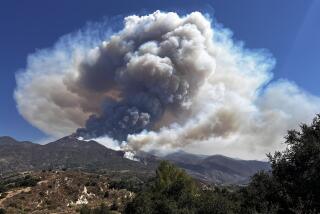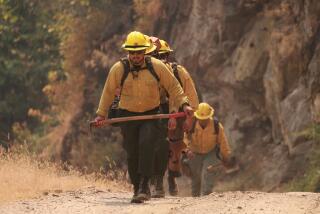L.A. FIREFIGHTERS: OVERTIME OVERKILL? : Firefighters Use Flexible Schedules to Live Out of State
Nearly two dozen Los Angeles city firefighters have what many would call the best of both worlds.
They work in Los Angeles, earning among the highest paychecks in their profession, but they reside in states across the West, where the living is cheap and the setting serene.
They’ve put down roots in Colorado, Oregon, Utah, Arizona, Texas and Nevada. Scores of others are spread across California’s rural and mountain landscapes, enjoying clean air, safe neighborhoods and unclogged roadways.
For their taxpayer-subsidized lifestyles, these out-of-towners can thank a free-wheeling scheduling system that some experts warn may not be healthy for the firefighters or the public.
Los Angeles city firefighters are given extraordinary latitude to tailor their schedules, taking weeks off at a time by trading days with colleagues.
This allows them to spend long stretches away from their jobs and at their faraway homes.
But there’s a flip side: To make up for their absences, they end up working days on end, prompting concerns about efficiency and fatigue.
Typically, city firefighters work a series of alternating 24-hour shifts averaging about 10 days on duty out of every 30. In a normal seven-day period, they work two or three 24-hour shifts, none consecutively.
But records show that many firefighters, particularly those commuting from other states, have traded themselves into working arduous schedules. For example, one out-of-state firefighter had 46 days off in a row last year by massaging his regular schedule and using a bevy of swaps. This was followed by unusually lengthy stints on-duty, including one span of 12 24-hour shifts in a row.
Another out-of-stater had 31 straight days off. In exchange, he had to put in some long shifts, including a stretch of 11 days out of 12.
While trading shifts is common among firefighters everywhere, most departments have imposed restrictions, capping the number of consecutive hours a firefighter can work to ensure station house continuity and minimize fatigue.
For example, some departments restrict consecutive hours to 38. Others, including the Los Angeles County Fire Department, allow as many as 120 hours, or five days and nights on, before requiring a full 24 hours off.
“We do think there is a limit, where someone’s well-being may be compromised by being on the job too long,” said county Fire Chief P. Michael Freeman.
City firefighters can work as many days in a row as they want as long as a captain determines that they are fit for duty. They also are allowed to trade up to 65% of their annual work schedule.
Beyond issues of fatigue, experts say, excessive shift-trading can compromise teamwork, one of the hallmarks of effective firefighting.
Firefighting specialists contend that knowledge of a colleague’s strengths, weaknesses and tendencies is critical during fires and other emergencies. Too much trading may keep a firefighter and his or her team members from working or training together nearly as often as they should. This is one reason most departments tightly restrict how many trades can be made.
“It’s an accountability and efficiency issue,” said Assistant Chief Rick Mumey of the Houston Fire Department, which limits its firefighters to about a third the number of trades that the city of Los Angeles allows.
“If I let my guy trade all the time, and I’m his captain, I never get to ensure his training,” Mumey said.
Although Los Angeles city fire officials acknowledged the unusual nature of arrangements for out-of-state firefighters, they expressed confidence in the department’s system to protect against firefighter exhaustion.
If a firefighter appears tired, city Chief William R. Bamattre said, he or she would not be allowed to work. “We don’t want people out there who are having fatigue problems, because we’re concerned about the quality of our service,” he said.
Asked if captains ever refuse to let firefighters work because of fatigue, department officials said yes. However, they said, no records are kept on such matters.
More to Read
Sign up for Essential California
The most important California stories and recommendations in your inbox every morning.
You may occasionally receive promotional content from the Los Angeles Times.










